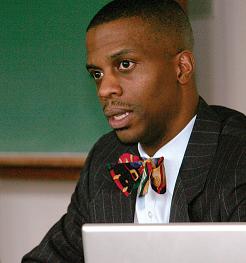Students’ Stories: In the Classroom
Learning to Teach to the “Big Ideas”

Quick is one of 12 Graduate Theological Union doctoral students participating in the GTU’s Preparing Future Faculty Project, a year-long training funded by the Teagle Foundation and Wabash Center for Teaching and Learning in Religion and Theology. Besides developing students’ practical teaching skills, the project aims to learn how faculty can best mentor future teachers to develop their sense of vocation and help them bring meaning and value into liberal arts classrooms. The program has provided students with two intensive seminars, a dozen faculty mentors, and the opportunity to teach courses at UC Berkeley and GTU-member schools.
This spring, with mentoring from San Francisco Theological Seminary and GTU history professor Christopher Ocker, Quick is teaching his course, “Theology and Ethics in Black and White: Aesthetics and the Political,” at American Baptist Seminary of the West (ABSW), where he’s also the current Howard Washington Thurman Teaching Fellow. This is his third semester in the GTU’s Philosphical and Systematic Theology doctoral program. An ordained minister, he wants to become an educator.
Quick grew up in Washington, D.C., and overcame dyslexia to graduate from Morehouse College and Princeton Theological Seminary. He has served a Baptist church in Atlanta, founded a faith-based consulting firm, and worked for the mayor of Washington, D.C., a congressman, and the governor of Georgia. His political background also includes roles as policy analyst, special programs administrator, and legislative representative.
"I won’t force my students to change what they believe, but I’ll challenge them to critically interrogate why they believe."
For the past two years, he has led the New Liberation Presbyterian Church in San Francisco. His experience in the pulpit clearly energizes his presentation in the classroom as he engages his students with a confident delivery that includes humor and storytelling.
Quick regards his teaching vocation as a “revolutionary activity,” an opportunity to help students expand beyond pre-set categories, such as race, gender, class, and politics. Freedom and self-fulfillment, he says, come from the teacher’s ability to “incite a revolt against ideas and dispositions that hinder intellectual growth and innovation.” For Quick, this is the essence of “teaching to the big ideas,” the purpose of the Teagle-Wabash program.
Adding to an already solid teaching background, Quick says he learned important practical skills in the August and January training seminars presented by seasoned educators — how to construct a syllabus, classroom management techniques, and effective technology use.
“I also learned the importance of a well-constructed pedagogical philosophy,” he says. “The workshops forced me to identify my own biases that I bring into the classroom. Unless we clearly lay out our biases to students, we lay landmines for them. Now they know up front that I’m interested in liberation and exploring concepts that may be oppressive — around gender, ethnicity, sexuality. I won’t force my students to change what they believe, but I’ll challenge them to critically interrogate why they believe, to see beyond realities, and to question them. For me, those questions and the ‘big ideas’ are couched within a radically communal ethos so that the ‘I’ cannot exist without the ‘we.’”
